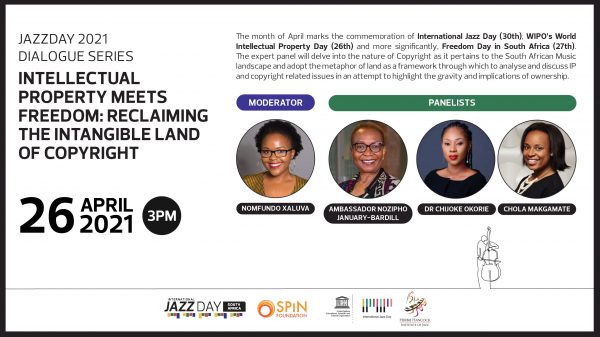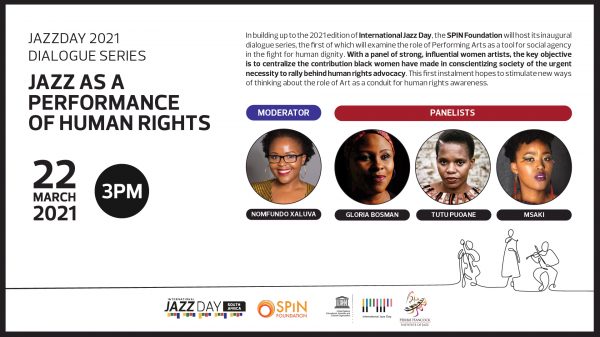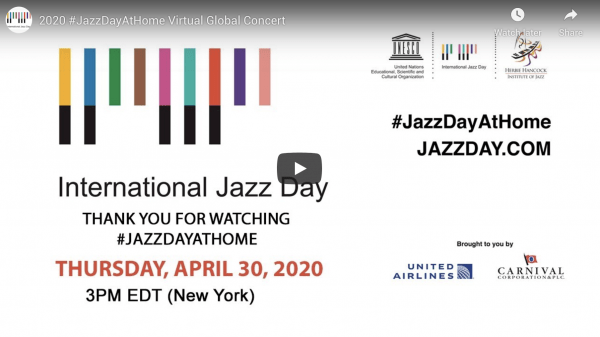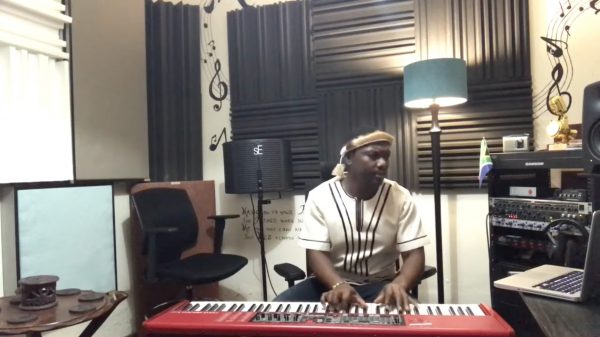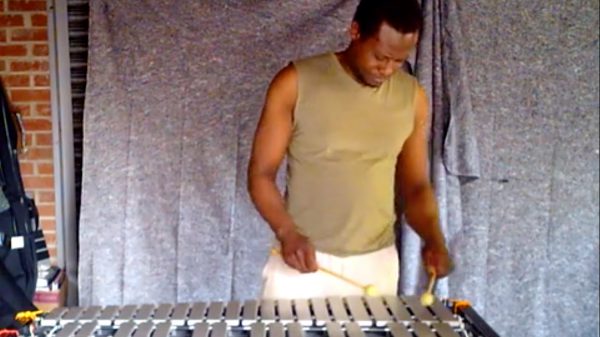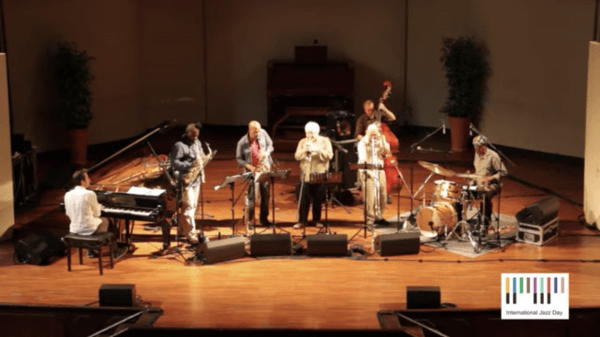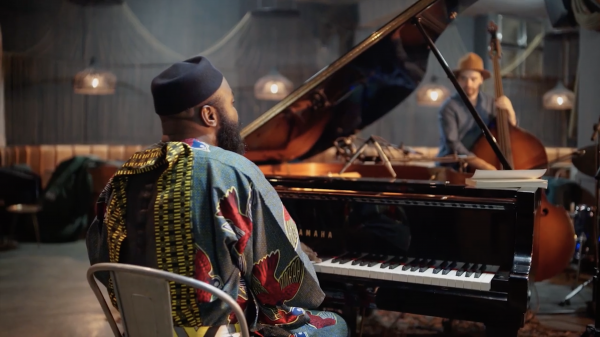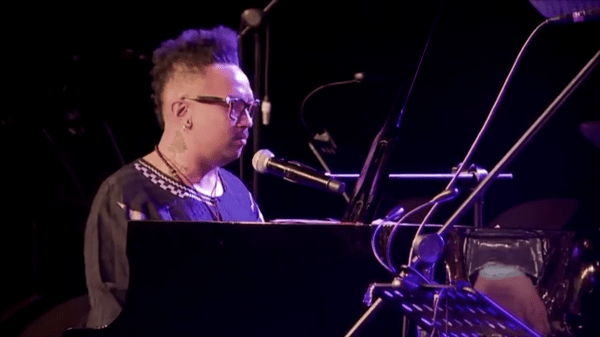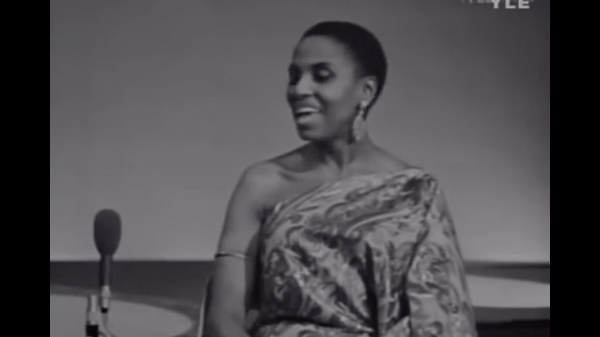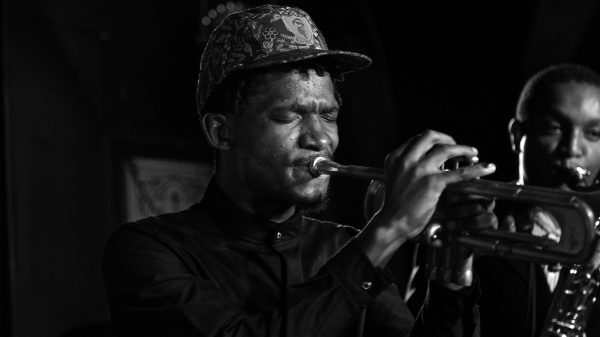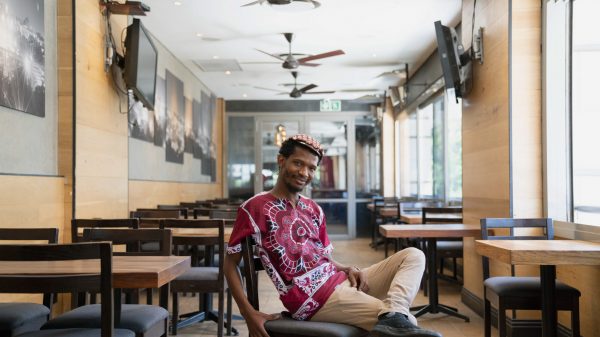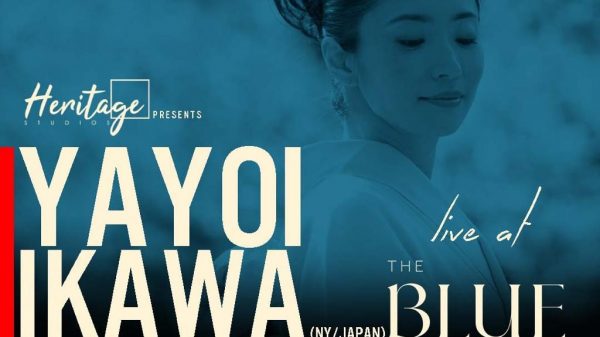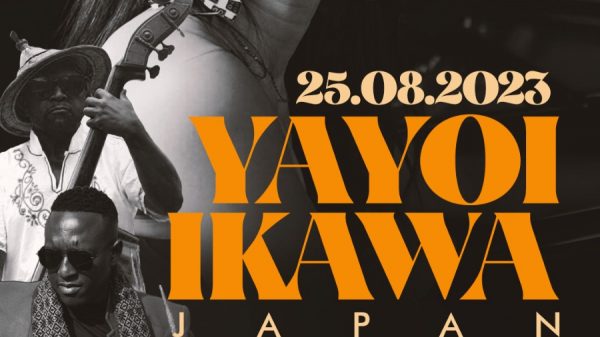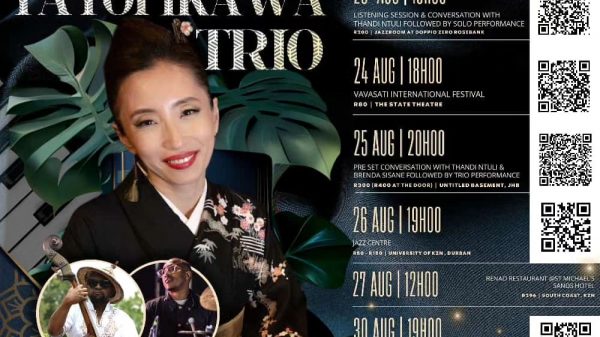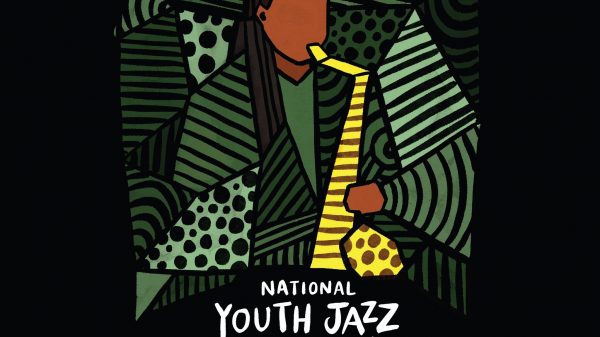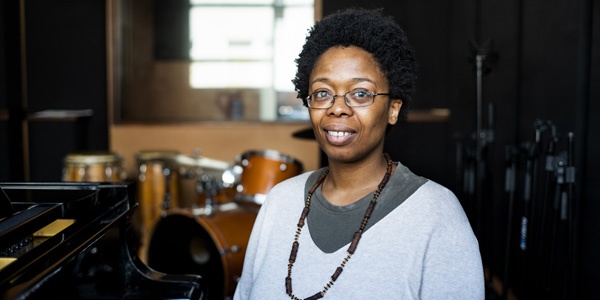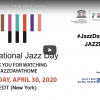By: Gwen Ansell
Photographer: Madelene Cronjé
The historic South African record label’s new release highlights its work as an archive for the country’s jazz scene since the 1960s.

m beyond excited,” says trumpeter and composer Mandla Mlangeni. “This represents a new trajectory for me [with] a label I’ve always held in high regard. I jumped at the opportunity with both arms and feet!”
Mlangeni is celebrating two things. The first is the 28 March release of his album Imvuselelo, which features the Swiss-based Birdsong Ensemble. The second is the label to which it’s signed.
Such enthusiasm is common when an international label signs a South African artist. But this time, the label is South African: the historic As-Shams/The Sun. Before Imvuselelo, the iconic red dot logo was last seen on a new (rather than reissued) album when saxophonist Mike Makhalemele’s Blue Mike was released in 1982. Mlangeni’s title is a rebirth in far more than lexical terms.
As-Shams has a 60-year history as the country’s first black-owned music group, through a label family that includes Soultown, Mandla, African Echoes and more. In mission and sound, it’s been our Atlantic and Blue Note rolled into one; the label’s work draws a sonic map of the struggle years.
The birth of the label
In 1952, two young black lawyers, Nelson Mandela and Oliver Tambo, set up office in central Johannesburg. They often lunched at a nearby restaurant owned by the family of As-Shams founder Rashid Vally, who waited tables and was entranced by the jazz on the jukebox. Fast-forward to 1960, and Vally persuaded his father to allocate a corner of the family general store on Kort Street to imported jazz LPs. Kohinoor World of Music, which rapidly took up most of the space, had been born.
Soon, Vally ran a small label, Soultown, releasing pop and dance music. The record store was also a hub for Johannesburg’s jazz community and he was astounded when, in 1971, Dollar Brand – having just returned from recording with Elvin Jones in New York – walked in and suggested recording. Three albums, Peace, Dollar Brand+3 and Underground in Africa,followed from the artist who would later change his name to Abdullah Ibrahim.
But Soultown was the wrong iconography for such sonically and politically radical music. In 1974, As-Shams/The Sun was born. The name, Ibrahim’s suggestion, asserted a shared Islamic faith and hope that the sun would one day rise on a free South Africa. Vally’s brother-in-law designed the distinctive red dot logo, giving an image to those politics.
An anthemic start
The first Sun album was Brand’s Mannenberg – Is Where It’s Happening, recorded in Cape Town and featuring a piano whose sounds had been altered by placing drawing pins on the key hammers. When the album was played at Kohinoor, the counters were besieged. Soon, more than 50 000 copies had been sold and an unofficial anthem for the anti-apartheid struggle born.
“Basil Coetzee and Robbie Jansen played it at almost every [United Democratic Front] rally around the country, and township youths put words to the tune,” says Vally.
Only a book could document all the iconic releases that followed. A sample of them might include the Pat Matshikiza and Kippie Moeketsi collaboration, Tshona!; much of the output of soul band The Beaters and jazz artists Mike Makhalemele and Tete Mbambisa; Dick Khoza’s Chapita; Gideon Nxumalo’s Early Mart; rebellious outfits such as Movement in the City and Black Disco; and international collaborations like the Hal Singer/Kippie Moeketsi Blues Stompin’.
Label manager Calum MacNaughton describes the label’s catalogue as “a genealogical map of the domestic jazz scene … while most public interest has focused on just a handful of highlights [such as Mannenberg], the journey underground with As-Shams is very deep.”
Multi-instrumentalist Pops Mohamed, recalling his own Black Disco sessions at Kohinoor, describes the atmosphere as projects were created involving musicians from all communities. “It was very important,” he recalls, “not to stay inside the [racial] classification.”
A priceless archive
Before a hiatus in the 2000s, a priceless archive grew, including tapes that were never issued. The current renaissance entails plans for extensive restoration. Some will go out on CD or vinyl, with digital access for more niche music. MacNaughton says the 1970s quarter-inch tape recording format has, surprisingly, “held up well … younger tape from the 1980s creates the most challenges”.
Still seeking a secure, permanent home for the archive, As-Shams has collaborated with the United Kingdom-based Matsuli Music and other labels on reissues. Now it is supplementing its restoring and archiving with strategic new releases to, MacNaughton says, “continue to function as an ambassador for South African jazz … and weave the past into the present”.
Paired with a re-release of Mbambisa’s 1979 Did You Tell Your Mother?, Mlangeni’s Imvuselelo is the first step along that road.
It’s an apt choice. To Vally’s jazz-fundi sensibility, the music recalls early Ornette Coleman: “Mandla Mlangeni is mean!” MacNaughton says the music “echoes As-Shams’ unfettered approach to recording”, as well as the label’s early patronage of black artists for sleeve art. Then, covers featured work from Mafa Ngwenya and Hargreaves Ntukwana; Imvuselelo employs a striking cattle graphic from Free State artist Baba Tjeko. A limited edition includes a Tjeko print.
The beginnings of Imvuselelo
Mlangeni began the project that would become Birdsong in 2016 with different personnel and material inspired by artist Kemang wa Lehulere, “but it didn’t take off until much later. In a strange sense the band in its initial manifestation has always been there,” he says, influencing how he shaped the sound of his Tune Recreation Committee.
Imvuselelo’s seven tracks were inspired “by the migratory patterns of birds”, the trumpeter explains. “How they fly to warmer climates and away from colder ones … the different names they occupy in various cultures, symbolising boundless freedom in the life of song. Many titles are metaphors or childhood stories that left an imprint on me.”
All the titles reflect a distinctively South African experience – Chicken Dust, Homelessness, Tau ya Afrika – but Mlangeni pays warm tribute to how his European collaborators continue the anti-racist legacy of South African jazz by collectively forging “sounds that resonate with the contours of each member’s experience”.
Reedmen Max Treutner and Benedikt Reising, trombonist Josephine Nagorsnik, bassist Oz Yehiely and drummer Felix Wolf shift joyfully between crisp bebop references and the kind of free playing that challenges and shapes passages of pure beauty, evoking earlier South African improvisers such as Mbambisa and Mongezi Feza.
The album makes for compelling listening. Its musical allusions are tightly compressed (the whole plays for under 40 minutes), never literal or obvious. There are plaintive waltzes, insistent marches and intriguing rhythms, like those of Homelessness. That track is a “unison horn melody that is seemingly free but plays in response to the groove”, Mlangeni explains. It was inspired by his experience of eviction: “Kicked out in the cold in a place you do not call home, what do you do? In my case, I wrote this tune.”
And such arbitrary displacement is another echo, of the Group Areas Act that hounded the Vally family through the apartheid years. The history, politics and brilliantly acute ears of Rashid – producer, networker, marketer – remain central to As-Shams’ identity, powering the decisions that made the label work.
As he told French musicologist Denis Constant-Martin, “At my place, people may come into the shop to buy disco, but they come back to buy jazz, because that’s all I play.”
An As-Shams playlist: Ten from the 1970s
Gideon “uMgibe” Nxumalo 1970 on Soultown. Early Mart – Frustration
Dollar Brand 1971 on Soultown. Peace – Tintinyana
Dollar Brand+3 with Kippie Moeketsi 1973 on Soultown. Bra’ Joe from Kilimanjaro
Dollar Brand 1974. Mannenberg – Is Where It’s Happening
The Beaters 1975. Harari – Title track
Bea Benjamin with Dollar Brand 1976. African Songbird – Africa
Tete Mbambisa 1976. Tete’s Big Sound – Stay Cool
Pat Matshikiza & Kippie Moeketsi 1976. Sikiza Matshikiza
Basil Manenberg Coetzee 1978 on the Mandla label. Shrimp Boats
Movement in the City 1979. Black Teardrops – Lament


